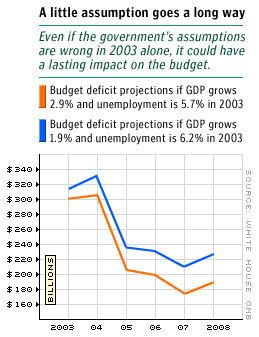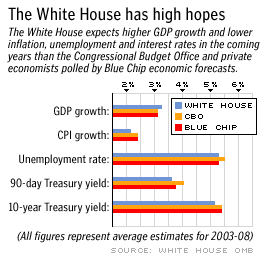NEW YORK (CNN/Money) -
The White House budget proposal released this week makes some assumptions about the economy and interest rates that could be overly optimistic -- especially if the economy stays stuck in the mud much longer.
The White House Office of Management and Budget said it based its budget outlook for 2003-2008 on the assumption the U.S. economy would grow 2.9 percent in 2003 and average 3.3 percent growth between 2003 and 2008.

While few economists seemed inclined to quibble with the 2003-08 estimate -- which practically matches the 3.2 percent rate assumed by the Congressional Budget Office and by the private economists polled by Aspen Publishers in its closely watched Blue Chip Consensus Forecast -- some said the outlook for 2003 is fraught with uncertainty.
"A lot of things have to go right even to get 2.3 percent growth for the year," said Lehman Brothers chief economist Ethan Harris, citing his own firm's forecasts. "I would be very surprised if we got numbers as strong" as the White House expects in 2003.
While one year's economic growth might not seem like a big deal, the White House said that, because of the way it crafts its budget estimates, one year's performance could have budget repercussions until 2008 and beyond.
| 
| |

| 
| 
|

|
 The president's team takes its case to Capitol Hill today -- a $2.2 trillion budget that calls for hundreds of billions in tax cuts and a record federal deficit of $304 billion. The president's team takes its case to Capitol Hill today -- a $2.2 trillion budget that calls for hundreds of billions in tax cuts and a record federal deficit of $304 billion.
|
|
Play video
(QuickTime, Real or Windows Media)
|
| 
|

|
|
For example, if GDP grows just 1.9 percent in 2003 instead of the expected 2.9 percent and the unemployment rate averages 6.2 percent in 2003 instead of the 5.7 percent the White House expects, the budget deficit would be $172.5 billion higher between 2003-08 than the $1.39 trillion the White House expects.
Most economists doubt the economy will be that weak or unemployment that high in 2003, however.
Like Federal Reserve policy-makers, who recently left their target for short-term interest rates alone and said the risks to the economy were balanced between weakness and inflation, the White House and most analysts think the economy's recent slowdown is due mostly to many companies, consumers and investors holding their collective breath, waiting for the uncertainty about Iraq to clear up.
"Most private- and public-sector forecasters, including the [Bush] administration, expect these restraints on growth to be overcome by the favorable fundamental forces that will propel this expansion for years to come," the White House said in its proposal.
But according to some economists, that's just wishful thinking.
"Economists and policy-makers at the moment seem to always be erring on the side of optimism in terms of their outlook for growth and the equity markets," said Rory Robertson, interest rate strategist with Macquarie Equities (USA). Robertson said he expected GDP growth in 2003 of between 2 and 3 percent, but that number "could easily be a lot worse if things go badly."

Even if a U.S.-led war in Iraq is the quick, easy success most analysts are forecasting, it's possible the lingering effects of the investment bubble of the late 1990s will keep businesses from spending and hiring throughout much of this year.
In fact, mainstream economists -- who tend to be optimistic -- figure the unemployment rate will barely budge in 2003, dipping to 5.9 percent, on average, from 6 percent at the end of last year. The White House is forecasting a drop to 5.7 percent.
With factories using less than 75 percent of their production capacity, businesses might have little stomach for costly factory improvements. Continued stagnation in business investment and hiring might actually make unemployment even worse, putting pressure on consumer confidence, and more importantly consumer spending, which fuels about two-thirds of gross domestic product, the broadest measure of the nation's economy.
The effect of interest rates, inflation
On the other hand, if these concerns are overly gloomy and the economy performs as well as the White House expects, its estimates of short- and long-term interest rates might be too weak, meaning the government could end up paying more interest on its debts than it expects, making its budget picture even worse.
The administration's forecast assumes the yield on 90-day Treasurys will average 3.6 percent from 2003-08 and the yield on 10-year Treasurys at 5.2 percent during that time, above current rates but slightly lower than those by congressional and private economists.
"If the economy recovers quickly, the 10-year rate could be 5.2 percent even earlier than what they're projecting, and it could be 6 percent in the coming years," said Rajeev Dhawan, director of the Economic Forecasting Center at Georgia State University's Robinson College of Business.
What's more, if government spending increases faster than the White House estimates -- a real possibility, since the budget office makes no assumptions about the cost of going to war or rebuilding or occupying Iraq -- then the Treasury may have to borrow more. More bond sales would drive bond prices lower, forcing yields higher. Bond prices and yields move in opposite directions.
If interest rates are 1 percent higher than expected through 2008, the White House estimates, the budget deficit during that time will be $155 billion higher than its own forecasts.
On the other hand, with higher economic growth and government spending, inflation might also be higher than the average consumer price index gains of 2.2 percent a year the White House estimates for 2003-08 -- a figure lower than the 2.4 percent estimated by Congress and private economists.
"Given all the other spending we're having to do for homeland defense and the military, my suspicion is that inflation is going to be higher than what the White House thinks and probably what [economists in the] Blue Chip [survey] and Congress think as well," said Northern Trust economist Paul Kasriel. "Historically, when we've seen a pickup in government spending concentrated in military spending, you tend to get somewhat higher inflation."
Higher inflation, coupled with higher interest rates, would actually help the budget, according to the White House, since it means people will have more dollars, meaning the government can take in more in tax receipts.
If inflation and interest rates are both 1 percent higher through 2008 than White House estimates, the budget deficit will actually be $110.7 billion lower than expected during that time.
In any event, overly optimistic budget forecasts are nothing new for the U.S. government.
"If you're doing budget planning in business, you budget for the downside risks, not for the most optimistic scenario," said Harris of Lehman Brothers. "But the federal government doesn't have to worry too much -- it's the only business that has a blank check."

|

